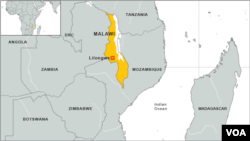More than 300 illegal migrants, mostly Ethiopians, are detained in Malawi prisons after finishing their sentences. Government officials say the prolonged stay provides a place to live while readying for deportation. But rights groups say keeping people in prison after their term is finished is illegal.
Malawi immigration authorities say these migrants were convicted of illegal entry into Malawi. They came through Tanzania on their way to South Africa.
“We have 358 [migrants in various prisons] countrywide," says
Department of Immigration spokesperson Joseph Chauwa. "In Blantyre, we have seven of them, in Dedza we have 32, in Ntchisi we have 64, and in Lilongwe we have 255. Most of these are Ethiopians and Congolese.”
Chauwa said many are just waiting to be sent them back home.
But prisoners’ rights activist Victor Mhango condemns this.
“That is illegal. They are actually breaking the law," he said. "They are keeping innocent people in prison illegally. The law says ‘you cannot keep somebody in prison after completing their sentences.’ After all you know our prisons are full and these people are subjected to cruel punishment after their sentences."
Government's stance
Malawi Chief Commissioner for Prisons Kennedy Nkhoma told VOA the released migrants are being kept in prisons out of good will.
“They are actually now housed," he said. "The Constitution of the Republic of Malawi allows housing and rehabilitating them. So now what we are doing is to house them before they are repatriated to their respective countries. They do not work; they just wake up in the morning and wait the time to be deported.”
But Mhango is not convinced.
“Is that a home or a prison? How come someone is provided shelter in prison? And why not finding them a better place to provide shelter?” he asked.
Poor nutrition
Doctors Without Borders Deputy Head of Mission in Malawi Nicollete Jackson says her team has been providing medical help in clinics of two major Malawi prisons — Maula in the capital Lilongwe and Chichiri in the commercial capital Blantyre.
“We see that many of them are malnourished," she said. "They do not eat the food. They do not like the food provided in prisons, which is inadequate anyway, they get one meal a day of nsima [a hard porridge made from maize flour], which has no proteins. So we see some of the Ethiopians suffering from protein deficiency.”
Repatriation
Jackson said some Ethiopians have been waiting nine months for repatriation. Nkhoma says the prolonged migrant prison stay is equally concerning to Malawi government authorities.
“We are spending too much on these people when we were not supposed to spend. And government will have to hire a plane to take these people to Ethiopia. So that again is an expense on government,” said Nkhoma.
Immigration spokesperson Chauwa said he could not tell when the migrants will be flown back to their respective countries. He told VOA his department has no funds for such action.
Addisu Abebe contributed to this story.








